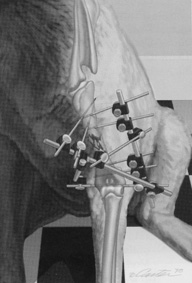LoveNCare Animal Hospital
SURGICAL SERVICESMon, Tues, Thurs, Fri:
8am - 7pm
Wed: 8am- 6pm
Sat: 8am - 2pm
Sun: Closed
(216) 531-5225
Surgical Services
Dr. Bedi provides many surgical services at our clinic, ranging from routine to advanced procedures. Because we want to ensure that our patients receive the best possible outcome, we occasionally refer them to specialists (board-certified veterinary surgeons) to perform complex operations when advanced equipment or training will be beneficial. Our veterinary team takes every precaution so that your pet receives the highest-quality care. We perform a physical exam and pre-anesthetic testing before surgery, monitor your pet during surgery and provide appropriate pain medication to keep your pet comfortable during recovery.
Spaying
Spaying your pet has many benefits. The procedure, which prevents female animals from becoming pregnant and reproducing, can help your dog or cat live a longer, healthier life. Spaying will not change your pet’s personality.
By spaying your female pet, you’re protecting her against potentially deadly diseases, including bacterial infections, reproductive tract diseases, and several types of cancer. You also won’t have to worry about her going into heat. This means avoiding the mess that often accompanies the heat cycle in female dogs and the pacing and crying that happens with female cats. In addition, spaying your pet will help control the dog and cat overpopulation problem, keeping more animals out of shelters.
Spaying, which involves removing the ovaries and uterus, is a surgical procedure and does need to be performed with the pet under anesthesia. We follow strict protocols and continually monitor your pet’s vital signs to help ensure her safety. Please see the descriptions under Anesthesia and Patient Monitoring for more information on what we do to keep your pet safe.
To set up an appointment to have your pet spayed or to learn more about this procedure, call or visit our clinic. If you are struggling with the decision of whether to spay your pet, please call us so we can discuss your concerns.
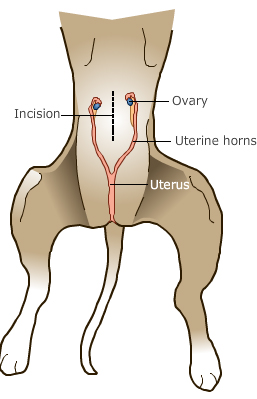
Neutering
Neutering your pet has many benefits. The procedure, which prevents male animals from reproducing, can help your dog or cat live a longer, healthier life. Neutering will not change your pet’s personality.
By neutering your pet, you’re reducing or eliminating his risk for prostate and testicular cancer, as well as sexually transmitted diseases. Neutering will also reduce or eliminate undesirable and embarrassing behavior, including roaming, fighting, humping, and spraying. In addition, neutering your pet will help control the dog and cat overpopulation problem, keeping more animals out of shelters.
Neutering, which involves removing the testicles, is a surgical procedure and does need to be performed with the pet under anesthesia. We follow strict protocols and continually monitor your pet’s vital signs to help ensure his safety. Please see the descriptions under Anesthesia and Patient Monitoring for more information on what we do to keep your pet safe.
To set up an appointment to have your pet neutered or to learn more about this procedure, please call or visit our clinic. If you are struggling with the decision of whether to neuter your pet, please call us or stop by so we can discuss your concerns.
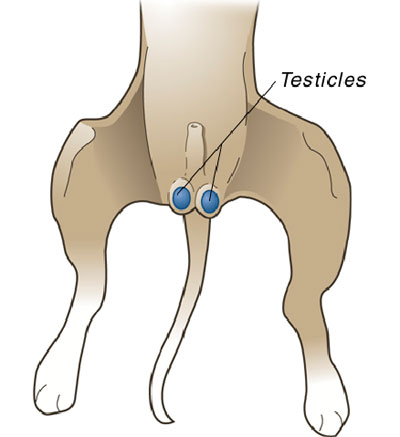
Ear Cropping
What is Ear Cropping?
For cosmetic purposes, ear cropping is performed on some breeds of dogs. Boxers, Great Danes, Doberman Pinschers, Miniature Pinschers, Schnauzers, Bouviers, American Pit Bull & Staffordshire Terriers are the most common breeds in which ear cropping is performed. More often than not, the proper age to perform this procedure is between 8 – 12 weeks of age. Ear cropping is considered a surgical procedure and is done under complete anesthesia. As a rule, dogs with longer ear cuts (Great Danes, Boxers, Doberman, etc.) should always be done at an early age to have a better chance for the ears to stand up . With age, the ears get bigger and heavier, and due to the weight of big ears, the cartilage that would make the ear stand up gets weaker. As a result, those ears will “flop” after they are cut. So, for better results, we recommend the procedure to be done around 8 weeks of age. Breeds with shorter cuts (American Pit Bull, etc.) also have a better chance of the ears standing when done early, usually before 12 weeks of age. It is not recommended to wait too long to have this procedure done. When the dog is older and bigger, the cost of anesthesia and surgery also are higher. Additionally, the ears take longer to heal.
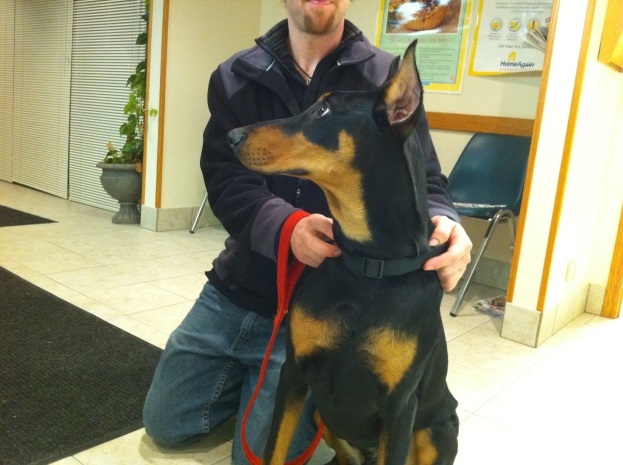

We recommend both a pre-surgical physical examination and pre-anesthetic blood work. This is to check the general health of your pet and is very important for the safe recovery of your pet from the anesthesia. Blood work is recommended because puppies can be born with defective organs which can endanger their recovery from anesthesia. Blood work is usually done a few days in advance of the procedure. Puppies must have updated vaccinations prior to admission for the procedure. Only vaccination records from a veterinarian are accepted as proof of vaccination. If needed, we can vaccinate and bring your pup up to date on all vaccinations before or on the day of the procedure.
Puppies must have updated vaccinations prior to admission for the procedure. Only vaccination records from a veterinarian are accepted as proof of vaccination. If needed, we can vaccinate and bring your pup up to date on all vaccinations before or on the day of the procedure.
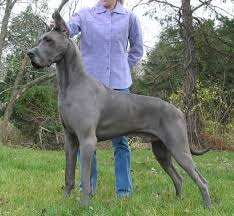
How is it done?
The Ear Cropping procedure is done under complete sedation, general anesthesia as well as gas anesthesia for the complete comfort of your pet during surgery. Once the procedure is done, pain medications and preventative antibiotics are administered while the pup is still in surgery. Ears are medicated and bandaged for 24 – 48 hours. Your pet is closely monitored during and after surgery for a safe and complete recovery. They usually go home that evening with written instructions and needed medications for at-home recovery and healing. Sutures are removed in 10 – 14 days. If done at the recommended age, most pups will not need splinting. If necessary, splinting is done after the ears have healed.

Declaw
Depending upon whether or not your kitten is using the scratching post to sharpen their claws – if your kitten is destructive with his or her claws and no other remedy resolves this destructive behavior, we recommend declawing to keep the family-pet bond stronger. In homes where kittens have damaged furniture and other household belongings, frustrated owners often let the cats go outside or give them to shelters where they are euthanized. To avoid this tragedy, we suggest declawing at a younger age (3-6 months). We recommend only front-paw declaw. Because a declawed cat cannot defend itself outdoors, these cats must be kept indoors only.
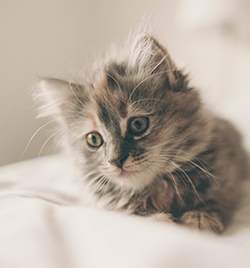
Caesarian Section
Most animals give birth without any complications. However, mothers occasionally need help with delivery. We usually attempt to resolve the problem using medical therapy first, but when that doesn’t solve the issue, we will perform a caesarian section.
During a c-section, the mother is given an anesthetic. An incision is then made along her abdomen and through the uterus to retrieve unborn puppies or kittens. In some situations, we may recommend that the mother be spayed during this procedure, usually to prevent future problems of this nature.

Soft Tissue Surgery
We perform many types of soft tissue surgeries at our clinic. Soft tissue surgeries are those that are not associated with bone. These surgeries can provide many benefits to pets.
Probably the most common soft tissue surgery performed on pets is the removal of masses, or lumps. Most of these masses, once removed and tested, are found to be benign (nonharmful); however, occasionally they are more serious. Early removal and accurate diagnosis of a lump is necessary to improve the outcome in your pet if the mass is cancerous.
If your dog suffers from frequent ear infections, surgical intervention can reduce their occurrence by improving airflow into the ear canal.
Surgery can also help resolve several problems related to the eyes. Tearing in your pet’s eyes can mean an infection is present or may be a sign that the cornea (outer layer of the eye) has been damaged. Surgery may allow the cornea to heal faster with less scarring, improving your pet’s ability to see. In some pets, the eyelashes may actually damage the cornea. Surgical intervention improves comfort in these pets, reduces the chances of corneal scarring, and enhances the pet’s vision in the long term.
Please contact us if you’d like to discuss how soft tissue surgery might be able to help your pet.
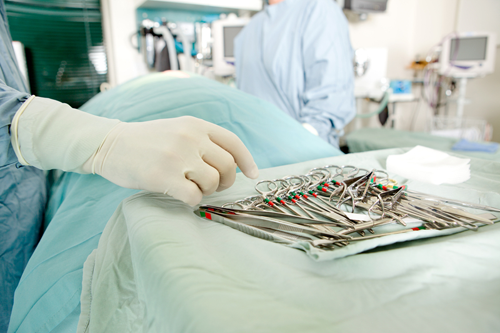
Abdominal and Orthopedic Surgery
We perform many types of orthopedic (bone) surgeries in our clinic. Because we want to ensure that our patients receive the best possible outcome, we occasionally refer them to board-certified orthopedic surgeons to perform back surgery and other very complex surgeries.
Leg fractures are the most common orthopedic problem presented at our clinic and usually result from a mishap with an automobile. They can be treated in a variety of ways depending on the location and type of fracture. We can apply a cast to treat certain fractures; however, many fractures will require surgical intervention:
- “Pinning” stabilizes the fracture by inserting a long stainless steel rod into the middle of the bone across the fractured area.
- “Plating” involves attaching a flat stainless steel plate to the bone using screws on either side of the fracture.
- “External fixation” stabilizes fractures using a series of pins on the outside of the leg that pass through the skin and into the bone on either side of the fracture.
We also perform a lot of orthopedic surgeries related to hip dysplasia and disc disease. Please contact us if you have any questions about these procedures or if you think your pet might benefit from them.
